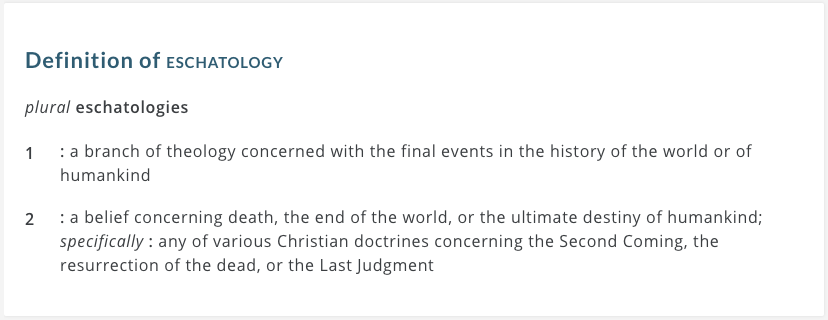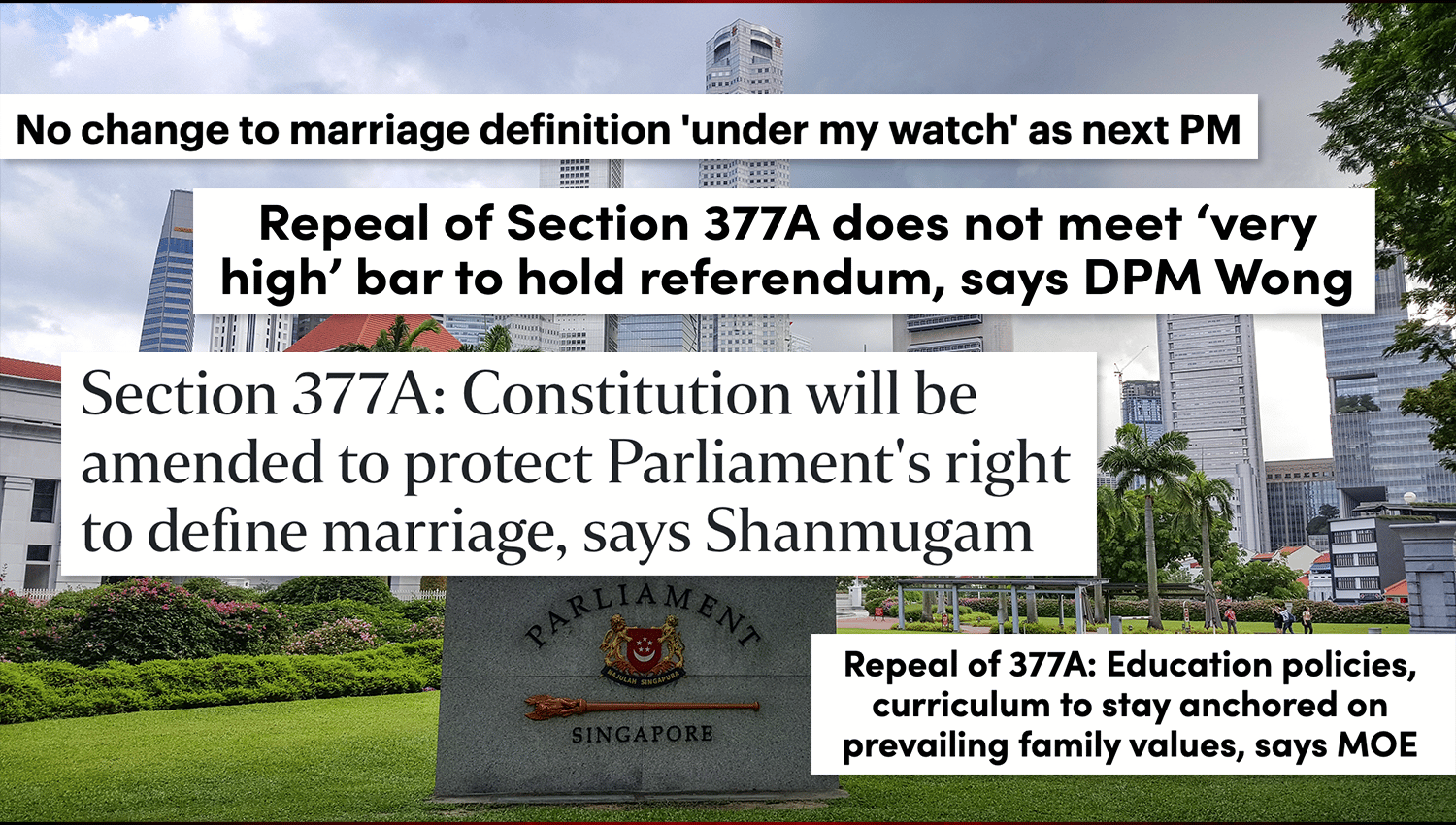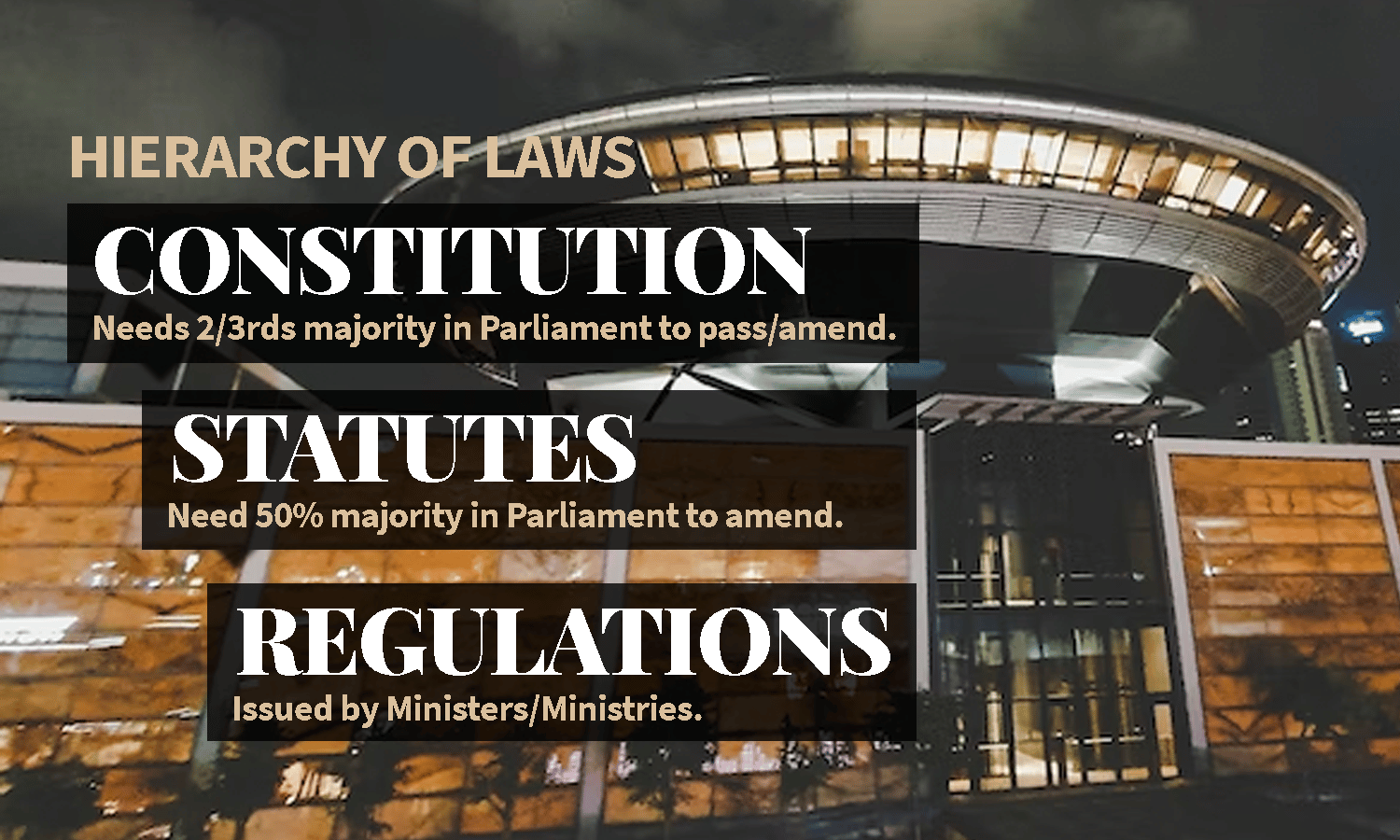Are the laws of the land a Christian’s business?
by Pastor Edric Sng // September 14, 2018, 12:31 pm

Are the laws of the land a Christian's business?
I will not pretend to be the most informed, assured eschatologist.
The word itself is so complex that I just had to Google it to make sure I spelt it correct:

There are large swathes of end-times passages in the Bible which fascinate me, but which I cannot claim to have a solid handle on. And the truth is, even the most expert of experts are basing their expertise on, at best, informed best guesses, for the fact that end-times theology is about something that is yet to come.
These segments of the Bible speak in metaphor and visual imagery. Revelation, for example. Joel. Matthew 24. The second half of the book of Daniel. The final chunks of Ezekiel.
Some believe what is foretold will unfold literally; so, for example, the red moon predicted in various passages (Joel 2:31, Acts 2:20, Revelation 6:12) will by this viewpoint literally be about our moon taking on a certain hue.
Some believe that everything is allegorical in nature, speaking in riddles. The stars would then not literally fall to the ground, as per Matthew 24:29. It could mean … well, it’s up to your interpretation.
So which will it be? We will only know when the truth unfolds at the actual end-times (if you even believe they are yet to take place … but that’s another discussion for another time).
Until then, what do we make of so-called end-times Scripture?
My approach is to draw from them principles applicable to informing the life I live today, regardless of how close we are to Jesus’ second coming. I don’t think the intent of the inclusion of the passages is to keep me up all night, staring at the stars and moon. I believe Scripture is here to make me a purpose-driven, fruit-bearing Christian.
I read a passage and – not knowing if it’s meant literally or metaphorically – I operate on the principle that both could be true.
The stars really could fall to the ground, whether shooting stars or something entirely more catastrophic (literal). Or it could be about, for example, celebrities and leaders of faith meeting an unseemly fall from grace (metaphorical).
Literally read, it informs me to file the notion away, for the day when a surprising number of cosmic collisions are reported, so I can look out for the Son of God coming through on the clouds. But that’s not particularly applicable for most days.
So I turn to the metaphorical interpretation, where I see the principle as one warning me to watch my life and my doctrine closely (1 Timothy 4:16) to ensure I am not among the number that fall.
Any metaphorical interpretation cannot stand in isolation; it must match up with the fullness of Scripture, without contradictions. That way, you know that even if you’re not sure this Scripture specifically relates to your interpretation, at least you’re still drawing an application that is faithful to other parts of the Word. So you’re still good.
Which brings me to Daniel 7:25.
The book of Daniel is really a book of two halves. The first six chapters are a historical narrative, while the remaining six chapters are a future prophesy, centred around Daniel’s dreams and visions.
Truth be told, Chapters 7 to 12 befuddle and confound me. There are animals and angels, and completely confusing numbers. There are thousands of interpretations out there about what they all mean. Daniel himself expresses this bewilderment right at the end of the book, when he says in Daniel 12:8 – “I heard, but I did not understand. So I asked, ‘My lord, what will the outcome of all this be?'”
From Daniel 7:25 we learn that the one of the approaches evil will take to defy God is the changing of laws.
That comforts me! At least even the prophet Daniel himself confesses he doesn’t know what he’s just heard! So it’s not just me.
Daniel 7:25 stuck in my mind recently because I heard a Pastor reference it in his preaching about Section 377A.
No point hiding under a rock and pretending nothing’s going on.
There is one camp campaigning for the repeal of the law, which effectively criminalises sex between men, even if consensual. This is opposed by what petitions, surveys and even politicans suggest are the majority – primarily on grounds of maintaining Singapore’s traditional family values, and protecting the nation against the possible consequences of a repeal.
For churches, generally speaking, the stand on homosexuality is clear, based on Scripture (non-mainstream interpretations notwithstanding). The point of contention, even within the church, is whether we should keep our personal faith viewpoint to ourselves, or if it’s something that should inform our engagement with wider, secular society.
This Pastor said he struggled with it too, and so he asked God for advice from Scripture. Straight away, he was led to Daniel 7:25.
He will speak against the Most High and oppress His holy people and try to change the set times and the laws. The holy people will be delivered into his hands for a time, times and half a time. (Daniel 7:25)
The “he” in this passage refers to a beast or a kingdom more powerful than the other beasts described in the chapter. This kingdom will devour the whole earth, trampling it down and crushing it, according to Daniel 7:23.
What we learn from verse 25 is that one of the ways this beast/kingdom will come against God is to “try to change the set times and the laws”. That’s from the NIV; NASB states that “he will intend to make alterations in times and in law”.
From this we learn that the one of the approaches evil will take to defy God is the changing of laws. And this, concluded the Pastor, is why we have to defend the laws that we identify as being in line with the heart and character of God.
If the people of God don’t care enough to stand up for godly values, no one else will. If not us, then who?
(Of course, as Christians, we’re commended to do so with love (Romans 12:10) and gentle humility (Galatians 6:1). We cannot disregard this part of the conversation – that above all else, we are called to love. The Church must improve on how we respond to real hurts, real needs. That discussion should precede the discussion in this article: What is true love, and how do we show it?)
This isn’t bigotry; it’s merely standing on our Constitutionally-protected right to express our religious views.
For example, you’d hope for Christians to contend passionately on things such as helping the oppressed and downtrodden, or against the presence of casinos in Singapore.
This must be fuelled by faith – and that’s a commendable thing. You’re supposed to pursue what you believe in (Romans 12:11).
It is disingenuous to suggest that any Singaporean doesn’t have the right to bring their personal viewpoint into a debate. There is no one on any side who enters any debate without their own sets of values and mores informing their stand.
This is the very basis of Singapore society: That we’re different, but we learn to understand each other, negotiate and accept boundary lines, and get along.
Neither is it wrong for a religious person to be informed by his or her religious teachings. It’s similar to how a person with exposure to other cultures or a liberal educational background will likely come to internalise, embody and espouse those perspectives.
And again, it is unfortunate but not wrong when those views are in direct contradiction with another Singapore’s views. This is the very basis of Singapore society: That we’re different, but we learn to understand each other, negotiate and accept boundary lines, and get along in harmony. It’s a process that must be intentionally forged, because it doesn’t come about naturally.
Where the line would be crossed is when constitutionally-protected freedoms are limited in the course of airing those views.
So: Can we passionately contend for laws we believe are good for a nation? Of course we can; this applies on both sides of the debate. No less than the Home Affairs and Law Minister has said that the voice of the people will determine the Government’s position on Section 377A.
But should we do so? Should we concern ourselves with the legal statutes of Singapore? Should we stay out of this discussion, leave our name off the petitions, on the basis of separation of church and state?
If we do, then don’t be surprised when the times and the laws change, and as cautioned in Daniel 7:25, the people are delivered into the hands of the fourth kingdom – however you choose to interpret it.
We are an independent, non-profit organisation that relies on the generosity of our readers, such as yourself, to continue serving the kingdom. Every dollar donated goes directly back into our editorial coverage.
Would you consider partnering with us in our kingdom work by supporting us financially, either as a one-off donation, or a recurring pledge?
Support Salt&Light


